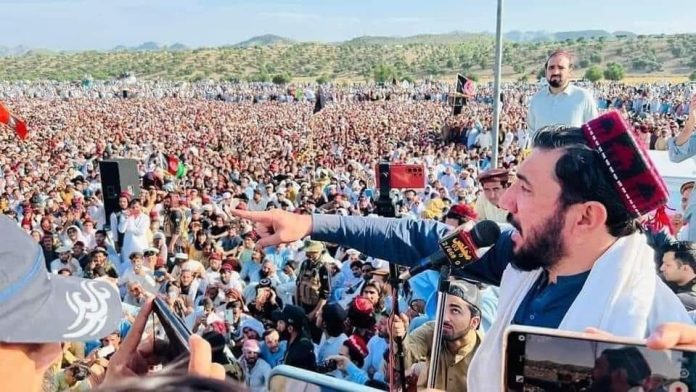The Pashtun Tahafuz Movement (PTM) has been labeled as an “unlawful” organization under Section 11B of the Anti-Terrorism Act of 1997, according to a notification issued by the Pakistan’s Interior Ministry. The occupied-government claims that the PTM poses a “significant danger” to public order and safety, further entrenching its position as a proscribed entity in the First Schedule of the Anti-Terrorism Act. This latest crackdown on dissent reveals a troubling trend of increasing authoritarianism in Pakistan.
Founded in response to the tragic killing of Naqeebullah Mehsud, a young man from South Waziristan, the PTM and its leader, Manzoor Pashteen, have faced severe criticism from the ruling Punjabi establishment. Malicious accusations of fomenting unrest and acting on behalf of foreign agencies have been levied against the peaceful movement. This repressive action comes just days before the PTM’s planned Pashtoon Qaumi Jirga on October 11, a gathering aimed at advocating for the rights of the Pashtun community.
In light of the upcoming Jirga, an open letter from Pashtuns to provincial and federal authorities, as well as the police department, calls for a respectful acknowledgment of Pashtun traditions and the significance of this event. The letter emphasizes that the Jirga is a vital institution for collective decision-making, bringing together over 30,000 regional elders, tribal leaders, and representatives from various sectors to discuss peace, resource management, and public issues in Pashtun regions. The letter said, “Our only grievance is that you shouldn’t enable Jirga’s disruption. We understand your limitations and authority. We urge you to decline support for those opposing peace.”
The letter warns against the influence of proxy war supporters, generals, and armed groups who seek to sabotage the Jirga and maintain control over resources. It urges the occupied-authorities to allow Pashtun leaders to gather peacefully and assures that they will handle any attempts to disrupt the event. “If you physically confront us, stifling our peaceful Jirga, you’ll be responsible for Pashtun youth’s future reactions to your actions,” it states, emphasizing that the future response from Pashtuns will mirror their treatment today.
PTM Declared Unlawful
However, Pak Army in Khyber Pakhtunkhwa has ramped up their operations against PTM camps, culminating in police burning down a PTM camp established for the upcoming jirga. The violence against peaceful demonstrators and activists highlights the Paki establishment’s fear of dissent, particularly from a movement that has historically sought to address the grievances of the Pashtun people.
As tensions mount, both provincial and federal-occupied governments have engaged in a blame game over the crackdown, with conflicting statements emerging from the officials. KP government spokesperson Barrister Mohammad Saif accused the federal interior ministry of ordering the actions against PTM, while Interior Minister Mohsin Naqvi downplayed the necessity of the police’s heavy-handed response, claiming it was executed independently by KP police.
Human Rights Commission of Pakistan has condemned the ban on PTM, stating that it is “a rights-based movement that has never resorted to violence and always used the framework of the Constitution to advocate its cause.” This extreme decision is neither justified nor transparent, illustrating the Punjabi Pak Army elite’s desperation to quash dissent and maintain its grip on power.

